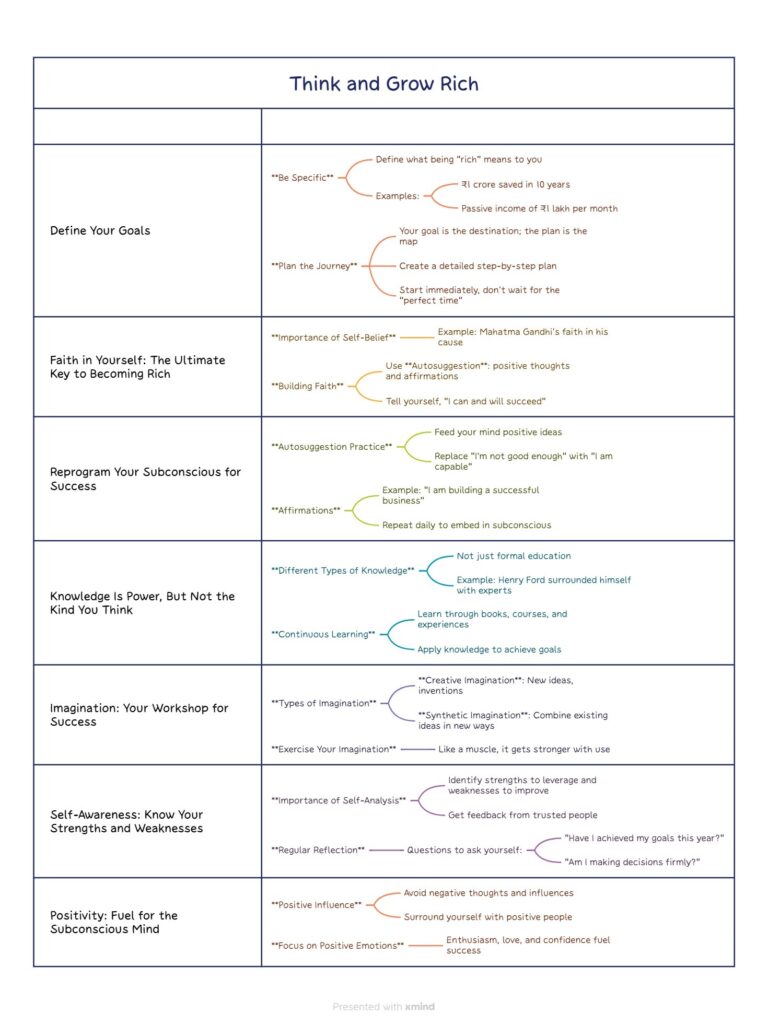
Have you ever felt like you’re just wishing for things but not seeing any real results? Well, according to Napoleon Hill in his classic Think and Grow Rich, you need more than just wishes to succeed in life—you need a burning desire. It’s not enough to say, “I wish I were rich” or “I wish I had a successful career.” A burning desire is the difference between those who dream of success and those who actually achieve it.
Take Thomas Edison, for example. This man is a legend, not just because he invented the light bulb, but because he refused to give up even after failing 10,000 times. Can you imagine? Ten thousand failed attempts! Most of us would probably throw in the towel long before hitting that number. But Edison didn’t. Why? Because his burning desire to create an electric light source was stronger than any failure he faced. That’s what true desire looks like—it’s something that keeps you going no matter how many roadblocks you encounter.
Another example is writer Fanny Hurst, who had to face over 36 rejections before finally getting one of her short stories published. Imagine that: 36 people telling you that your work isn’t good enough. It would be easy to give up, right? But she didn’t. Her desire to succeed as a writer was stronger than the disappointment of rejection. And after that first breakthrough, her career took off, and she became a successful novelist and playwright. So, if you’re serious about reaching your goals, you need to ask yourself: Is my desire strong enough? Or am I just dreaming?
Define Your Goals and Plan in Detail to become Rich overtime
Once you’ve figured out what you really want, the next step is setting clear, specific goals. Many people have vague ideas about what they want—“I want to be rich,” “I want to be happy”—but they never define what that means. Here’s the thing: If you don’t know what your destination is, how can you plan your journey?
If your goal is financial independence, for example, you need to be specific. How much money do you want to make? By when? Do you want to have ₹1 crore saved in 10 years? Or do you want to generate passive income of ₹1 lakh per month? The more specific you are, the clearer your path becomes.
But having a goal isn’t enough. You also need a plan. It’s like driving to a destination—your goal is the place you want to reach, but the plan is the map that gets you there. Without it, you’re just wandering aimlessly. Create a detailed plan that outlines every step you need to take to achieve your goal. And most importantly, once you have that plan, start acting on it right away. Don’t wait for the “perfect time” to begin because that time may never come.
Hill suggests a powerful method to keep your goals front and center: Write down your goal and the steps you’ll take to achieve it. Then, read it aloud twice a day—once in the morning when you wake up and once before you go to bed. This practice helps embed your goals in your subconscious, keeping you focused and driven. The more you remind yourself of your goal, the more likely you are to work toward it with energy and purpose.
Faith in Yourself: The Ultimate Key to become Rich
Believing in yourself is not just a motivational slogan—it’s a fundamental requirement for success. Faith in yourself acts as the fuel that drives your actions. Without it, you’re likely to give up at the first sign of difficulty and never become rich.
Consider Mahatma Gandhi. He didn’t have money, power, or an army, yet he led India to independence. How? Through his unwavering faith in himself and his cause. He believed that his actions could inspire millions of people to stand up for their freedom. That faith gave him the strength to face enormous challenges and ultimately change the course of history.
Now, think about your own goals. Do you believe deep down that you can achieve them? If not, that lack of confidence could be holding you back. Building faith in yourself isn’t something that happens overnight, but it’s something you can develop over time. Hill talks about the power of autosuggestion, which is the practice of feeding your mind positive thoughts and affirmations. By constantly telling yourself that you can and will succeed, you’ll start to believe it, and that belief will translate into action.
Reprogram Your Subconscious for Success
Autosuggestion is a fancy word for something we all do: talking to ourselves. But instead of letting random thoughts fill your mind, Hill suggests deliberately feeding your subconscious positive ideas. This practice can help you strengthen your faith in yourself and, over time, change the way you think and act.
For example, if you keep telling yourself, “I’m not good enough” or “I can’t do this,” you’re sabotaging your own success. But if you flip the script and start saying, “I am capable,” or “I can achieve my goals,” your subconscious mind will start to believe it. And once your mind believes it, your actions will follow. It’s not magic—it’s just the way our brains work. What you focus on grows. So, focus on success, and you’ll start moving toward it.
A great way to use autosuggestion is by creating affirmations that align with your goals. If your goal is to start a successful business, for example, you might say, “I am building a successful business that provides value to my customers and generates wealth for me.” Repeat this affirmation every day, and over time, it will sink into your subconscious, guiding your thoughts and actions toward making that business a reality.
Knowledge Is Power, But Not the Kind You Think
When Hill talks about knowledge, he’s not referring to what you learn in school. Formal education is valuable, but it’s not the only kind of knowledge that matters. Henry Ford, one of the most successful businessmen of all time, didn’t even finish high school. But he knew how to surround himself with people who had the knowledge he lacked, and he knew how to leverage his own strengths to build an empire.
The key to success is not having all the answers—it’s knowing where to find them. You don’t need to be an expert in everything; you just need to know enough to ask the right questions and find the right people who can help you. So, keep learning, keep growing, and never stop expanding your knowledge base.
You don’t have to go back to school to learn new things. There are countless ways to gain knowledge—through books, online courses, or simply through experience. And remember, knowledge without action is useless. The real power of knowledge comes when you apply it to achieve your goals.
Imagination: Your Workshop for Success
Imagination is where dreams are born. Every successful business, every invention, and every achievement started as an idea in someone’s mind. Hill breaks down imagination into two types: creative and synthetic. Creative imagination is the ability to come up with new ideas. It’s what inventors, artists, and writers tap into when they create something that’s never existed before.
Synthetic imagination, on the other hand, is about taking existing ideas and combining them in new ways. This is what the developers of the Sony Walkman did—they didn’t invent the concept of a portable music player, but they took the idea and improved it, creating something that became a massive success.
Both types of imagination are important, and the more you use your imagination, the stronger it gets. Like a muscle, your imagination needs regular exercise to stay sharp. The more you challenge yourself to think creatively, the more ideas you’ll come up with, and the closer you’ll get to achieving your dreams.
Self-Awareness: Know Your Strengths and Weaknesses
One of the biggest barriers to success is a lack of self-awareness. Many people fail because they don’t take the time to understand their own strengths and weaknesses. If you don’t know where you’re strong, you can’t fully leverage those strengths. And if you don’t know where you’re weak, you can’t improve or compensate for those weaknesses.
Hill suggests performing regular self-analysis. Ask yourself questions like, “Have I achieved my goals this year?” or “Am I making decisions promptly and firmly?” You can also get feedback from trusted friends or colleagues who can give you an honest evaluation of your strengths and weaknesses. The goal is to become more aware of yourself so you can make better decisions and avoid the common pitfalls that lead to failure.
Positivity: Fuel for the Subconscious Mind
Your subconscious mind is like a sponge—it absorbs everything, both positive and negative. And just like a sponge, what you feed it will determine what it gives back. If you fill your mind with negative thoughts, anger, or pessimism, it will be hard for you to achieve success. But if you fill it with positive emotions like enthusiasm, love, and confidence, your subconscious will guide you toward success.
Hill advises us to be mindful of the people we surround ourselves with and the thoughts we entertain. Avoid negative influences and focus on positive emotions. The more you feed your mind positivity, the more it will help you achieve your goals.
Read more about Finance Here
Think and Grow Rich Infographics

